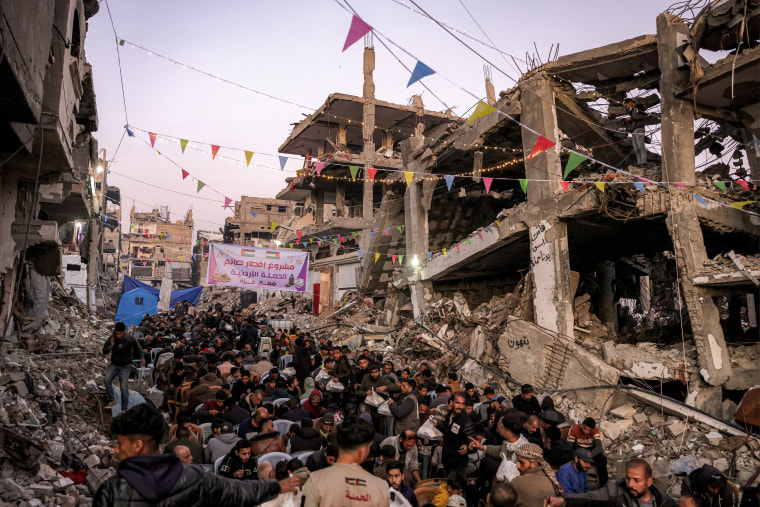Israel halted all entry of humanitarian aid and goods into the Gaza Strip on Sunday and warned of “further consequences” after Hamas refused to accept its proposal to extend the first phase of the fragile ceasefire deal.
This followed a U.S. announcement to expedite the delivery of $4 billion in military aid to Israel, and reverse a Biden administration partial arms embargo.
On Sunday morning, thousands of aid trucks were seen piling up at the Egyptian side of the Rafah crossing after Israel closed its checkpoints into Gaza.
The first phase of the Hamas-Israel ceasefire expired Saturday, and negotiations for the second phase, which would have ultimately led to the end of the war, have been stalled for weeks.
“Prime Minister Netanyahu has decided that, as of this morning, all entry of goods and supplies into the Gaza Strip will cease,” the prime minister’s office said in a statement, adding, “If Hamas continues its refusal, there will be further consequences.”

Basem Naim, a senior official for Hamas’ political bureau, accused Israel of “sabotaging” the existing three-phase ceasefire agreement both sides had signed in January.
He condemned Netanyahu and the Trump administration for what he called “a blatant coup against the ceasefire deal,” adding that Israel bears “all the responsibility for escalating the situation and for the lives of the people on both sides.”
Israel’s announcement came after Netanyahu held an overnight security meeting where Israel adopted a plan by U.S. special envoy to the Middle East Steve Witkoff to extend the first phase of the six-week ceasefire through Ramadan and Passover.
Under the proposal, half of the remaining hostages, including bodies of those who have died, would be released on day one of its execution, with the rest released upon successful negotiation of a permanent ceasefire, according to Netanyahu’s office.
Hamas has refused the proposal, insisting that the ceasefire talks proceed to the second stage, which would see the release of additional hostages and prisoners, the withdrawal of Israeli forces from Gaza, and lead to a permanent end to the war.
Hamas said Israel’s decision to halt aid amounted to “blackmailing” and urged mediators U.S., Egypt, and Qatar to put pressure on Israel to implement humanitarian protocol under the ceasefire.
Since the ceasefire agreement came into effect on Jan. 19, more than 10,000 aid trucks carrying food, medicine, and tents have arrived in Gaza, according to the United Nations’ top aid official, Tom Fletcher. The first phase also halted months of fighting and saw the exchange of 33 Israeli and five Thai hostages for nearly 2,000 Palestinian prisoners and detainees.
The Hamas-led terror attack on Oct. 7, 2023, killed about 1,200 people, and another 251 were captured, according to Israeli officials. Israel’s ensuing military offensive in Gaza has killed more than 48,000 Palestinians, according to the local Health Ministry, destroyed much of the enclave, and forcibly displaced most of its population of 2.2 million.
Israeli far-right lawmakers welcomed Netanyahu’s decision to block aid. “The decision we made last night to completely halt the entry of humanitarian aid into Gaza…is an important step in the right direction—‘the threshold of the gates of hell’,” Israeli finance minister Bezalel Smotrich posted on X on Sunday.
He then called for the gates of hell to be opened “as quickly and as lethally as possible.”
By Sunday morning, Israeli forces had killed at least four people across Gaza, Dr. Marwan Al-Hams, director general of field hospitals, told NBC News.
The International Criminal Court has issued arrest warrants for Netanyahu and former defence minister Yoav Gallant over alleged crimes against humanity and war crimes in the Gaza Strip — charges Israel rejects. The Biden administration also rejected arrest warrants but along with many members of the international community, warned of a humanitarian crisis in Gaza after Israel allowed little aid to enter during more than a year of fighting.
